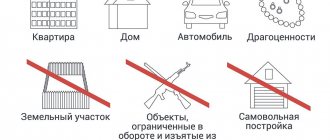New edition of Art. 154 of the Criminal Code of the Russian Federation
Illegal actions of adopting children, placing them under guardianship (trusteeship), for upbringing in foster families, committed repeatedly or for mercenary reasons -
shall be punishable by a fine in the amount of up to forty thousand rubles, or in the amount of the wages or other income of the convicted person for a period of up to three months, or by compulsory labor for a term of up to three hundred sixty hours, or by corrective labor for a term of up to one year, or by arrest for a term of up to six months.
Commentary on Article 154 of the Criminal Code of the Russian Federation
1. The legal basis for the adoption of children, placing them under guardianship (trusteeship), for upbringing in a foster family are determined by Chapter. 19 - 21 SK, as well as Art. 31 - 40 GK.
2. The social danger of the crime lies in the fact that the illegal placement of children can threaten their life, health, moral and mental development, violate the right to take into account their ethnic origin, belonging to a particular religion and culture, native language, and the possibility of ensuring continuity in upbringing and education .
2.1. The article under comment consists of one part, establishing the main elements of the crime. Acts provided for in Art. 154, belong to the category of crimes of minor gravity.
3. The object of a criminal attack is the social relations that arise when placing children in the form of adoption, placing them under guardianship (trusteeship) or foster care (Part 1, Article 1, Part 2, Article 54 of the Family Code).
4. The objective side of the crime is expressed in illegal actions to adopt children, transfer them into guardianship (trusteeship), and be raised in foster families.
4.1. Actions to adopt children, place them under guardianship (trusteeship), or place them in foster families, committed in violation of the procedure established by law, are illegal. The following actions to adopt children, place them under guardianship (trusteeship), and be raised in foster families can be considered illegal, such as: a) allowing brothers and sisters to be adopted by different families or placing them in different foster families if this is contrary to the interests of the brothers and sisters (part 3 of article 124, clause 2 of part 2 of article 154 of the SK); b) permission for the adoption of a child by foreign citizens or stateless persons, if it is possible to transfer these children for upbringing to families of citizens of the Russian Federation permanently residing in the territory of the Russian Federation, or for adoption by relatives of the children, regardless of the citizenship and place of residence of these relatives (Part 4 of Art. 124 RF IC); c) indication by the guardianship and trusteeship authority of knowingly false information in the conclusion about the validity of the adoption and its compliance with the interests of the adopted child (Part 2 of Article 125 of the Family Code); d) silence or communication of knowingly false information about circumstances relating to the identity of the adoptive parent, guardian, trustee, members of the foster family, if these circumstances interfere with the adoption of children, their transfer to guardianship (trusteeship), for upbringing in foster families (Part. 1 Article 127, Part 1 Article 128, Article 146, Part 1 Article 153 of the SK, Clause 2 Article 35 of the Civil Code) (for example, documents about the age of the adoptive parent and the state of health of the adoptive parent, guardianship and trusteeship authorities are falsified " turn a blind eye” to the adoptive parent’s criminal record or lack of permanent residence); e) ignoring the ethnic origin of the child, his belonging to a certain religion and culture, native language, the opportunity to ensure continuity in upbringing and education (Clause 3, Part 1, Article 123 of the Family Code); f) ignoring the consent of parents, guardians, adoptive parents of a child for his adoption, when such consent is required (Articles 129 - 131 of the Family Code), etc.
5. Illegal actions to adopt children, transfer them to guardianship (trusteeship), to be raised in foster families form a crime qualified under Art. 154, if they are committed: a) repeatedly or b) for selfish reasons.
5.1. Repeatedness means the commission of two or more acts provided for in the comment. article, if these acts were not covered by the single intent of the perpetrator.
6. The corpus delicti is formal in design.
7. From the subjective side, a crime is characterized by guilt in the form of direct intent.
8. A mandatory alternative sign of the subjective side is motive - self-interest.
8.1. A crime is committed out of self-interest if the perpetrator carries out illegal actions to adopt children, place them under guardianship (trusteeship), to be raised in foster families, wanting to receive money, other valuables, property services in return, or to avoid material costs.
9. The subject of a criminal offense is a physically sane person who has reached the age of 16.
Mego-Info - Legal portal No. 1
- The mixing of a woman or a man before entering into a relationship in a natural or unnatural way in a special way, such as a woman or a man, materially or service deposits, -
is punishable by a fine of up to fifty non-compliant minimum incomes of citizens or by arrest for up to six months.
- TI Sami Dії, Pogrozoi Znishzhennya, Poschojennya abedly, Maine Merena Merena (Mortgage) Chi (Yogo) Plizykikh natives of the aboard of videmosts, gang ї (yogo) Chi near natives.
is punishable by arrest for up to six months or imprisonment for up to three years.
- Suffering from this particular evil can be either a woman or a man who is in material or service position as a wine person. Even younger individuals can be tolerant. Since the suppression led to statutory damages from a person who had not reached state maturity, the guilty person is guilty of a set of crimes (statutes 154 and 155 CC).
Warehouse of evil, transferred to the station. 154 QC, we may not be aware of the fact that the person who suffered from female or human status received an influx of material or service from a wine person. The method is to force oneself to enter into relations with the state in a natural or unnatural way, against one’s will.
- The material value of the injured individual is due to the fact that the individual lives on a permanent or frequent basis, lives on her living area, and also if the individual is inactive in her actions. It is now possible to call out the severity of the deterioration of the material state of the injured individual (section 15 Paragraph 2 of the PPVSU “About court practice in the courts about crimes against state freedom and state inadequacy of individuals” dated May 30, 2008 No. 5).
- The position of service takes place if a woman or man covers the position, therefore it is due to a person who is stagnant, or falls under the control of such an individual (for example, an auditor a), or the interests of the injured person lie in the position of service that the guilty person occupies (for example, the commandant of the village).
- On the objective side of the meaning of evils, it is necessary to mix a woman or a man before entering the joints in a natural or unnatural way. Such a connection could be: a natural act, an act of sodomy or lesbianism, which, according to the intention of the guilty individual, the individual may have suffered as a result of her abuse (division 15, paragraph 1 of the designated Resolution).
- Primushuvannya is not the rightful influence on a woman or a man with this, in order to suppress her (her) power over the will to enter into natural or unnatural state connections. Paying attention to one's objective qualities will threaten the patient with serious expenses and inconveniences. The release to the will of an injured individual represents a threat of real or actual action, such as placing them in a worse financial and service position or otherwise, the interests of such an individual (for example, reduction of material assistance or allowances for work, the ability to earn living space, threat to salaries, transferred to a lower paid job).
The very proposition of the individual, which is laid down according to the work, until the entry of the article links, for the purpose of mixing, includes the stasis of the article. 154 CC. It is not possible to see how the color of another person is washed down to paint their material and service position, as a woman or man gives the right to enter into article relations. Such actions are straightened at the end, in the warehouse of malignant, transferred to Art. 154 KK, do not take revenge.
- You can use this mixture both for a one-time connection, and for non-disposable article wear, or for spivzhittya. The admixture can be directed to those in order to distinguish the other person to a stately connection both with the one who is admixed and with the other person, for the sake of which person is at fault.
- The evil is considered to be completed from the moment of mixing of a man or woman until the entry of the joints in a natural or unnatural way. For reliability per article. 154 CC itself does not extract a statutory bond from the victim. Such things are found behind the boundaries as a sign of a warehouse of evil.
- Subjective side. Guilt is a direct culprit. In addition, the person who is actively involved in the treatment of the injured person has a special purpose - to enter into contact with her or with another special relationship.
- A special subject of evil is a person, both human and female, who has reached 16 years of age and how much the person has suffered, either financially or in service.
- Tight fittings, included in Part 2 of Art. 154 KK, there is emphasis before entering the article's language, with the threat of: 1) depletion, harm or forfeiture of the patient (suffered) and his (his) close relatives; 2) dissemination of information to destroy her (yo) and close relatives.
- Threat of impoverishment, harm or forfeiture of the injured (suffered) and (young) close relatives. The threat may be addressed to a patient person and is perceived as real. The threat can be one-time or large-scale, such that it develops into a permanent threat. The threat can be brought to the attention of the victim directly or transmitted to her through other people. This may include the interests of the victim or her close relatives.
- About the understanding of close relatives of divas. paragraph 40 of the commentary to art. 115 KK.
- Decreased lane - this is the result of a lane that is due to a patient individual or close relatives, to the point of complete irrelevance for the purpose of vikoristanya for recognition. The Poshkodzhennya Maina is not the same as the one given to the chastkov (the report on the depletion and Poshkodzhennya Maina is a marvelous comment to Article 194 of the Code).
- The threat of violence means the threat of unlawful ways from the standpoint of violence, or without such, save the ruler of this lane for the last hour or the next time.
- Threat to publicize that the victim or her close relatives will be persecuted. Such a threat conveys the communication of such information in any way to the knowledge of those who are unaware of it and whose knowledge of it is unnecessary for the victim. This sign may be stamped upon qualification of a wine individual for part 2 tbsp. 154 QC regardless of whether the information will be brought to the attention of a wide audience or whether you want one or several individuals to be published. Under the circumstances of the persecution of an injured person or of their close relatives, considerations are taken into account, both in the minds of the persons concerned and objectively, in order to diminish the honor and worth of the individual. In which case there is no significance, this is confirmed by the performance data and the results.
‹ Article 153. Violent gratification of state addiction in an unnatural way up Article 155. Articles of wear and tear from a special person who has not reached state maturity ›
Another comment on Art. 154 of the Criminal Code of the Russian Federation
1. The objective side of the crime consists of illegal actions to adopt children, transfer them into guardianship (trusteeship), and be raised in foster families. The illegal nature of the listed actions is associated with a violation of the order contained in legislative and other normative acts regulating these issues (see the Family Code of the Russian Federation and other normative legal acts).
2. For the existence of a crime, it is necessary that those specified in Art. 154 of the Criminal Code of the Russian Federation, actions (in the absence of selfish motives) were committed repeatedly, i.e. more than twice. This sign can be established both when there is a gap in time between the placement of each child, and when two or more children are placed at the same time.
3. Subjective side - guilt in the form of direct intent. Its obligatory sign (in the absence of the sign of repetition) is motive - selfish motives, i.e. the desire to obtain material benefit from one’s illegal actions.
4. The crime has a formal composition and is considered completed at the moment of repeated commission of illegal actions or at the moment of the first action, if it was committed for selfish reasons.
5. The subject of a crime may include two categories of persons: 1) any person who has reached the age of 18 years, who illegally adopted a child, becoming his guardian (trustee) or adoptive parent; 2) persons who, in connection with the performance of official duties, took part in the commission of illegal actions considered by Art. 154 of the Criminal Code of the Russian Federation.
Article 154. Structure of payment for residential premises and utilities
Article 154. Structure of payment for residential premises and utilities
[Housing Code] [Title VII]
. Payment for residential premises and utilities for a tenant of residential premises occupied under a social tenancy agreement or a rental agreement for residential premises of a state or municipal housing stock includes:
- 1) payment for the use of residential premises (rental fee);
- 2) payment for the maintenance of residential premises, including fees for services, work on managing an apartment building, for the maintenance and current repairs of common property in an apartment building, as well as for cold water, hot water, electrical energy consumed during the use and maintenance of the common property in an apartment building, for the disposal of wastewater for the purpose of maintaining common property in an apartment building (hereinafter also referred to as communal resources consumed during the use and maintenance of common property in an apartment building). Major repairs of common property in an apartment building are carried out at the expense of the owner of the housing stock;
- 3) payment for utilities.
1.1. Payment for residential premises and utilities for the tenant of residential premises under a rental agreement for residential premises of a social housing stock includes:
- 1) payment for the rental of residential premises, established in accordance with Article 156.1 of this Code;
- 2) payment for utilities.
. Payment for residential premises and utilities for the owner of premises in an apartment building includes:
- 1) payment for the maintenance of residential premises, including fees for services, work on managing an apartment building, for the maintenance and routine repairs of common property in an apartment building, for utility resources consumed during the use and maintenance of common property in an apartment building;
- 2) contribution for major repairs;
- 3) payment for utilities.
. Owners of residential buildings bear the costs of their maintenance and repair, and also pay for utilities in accordance with agreements concluded, including in electronic form using the system, with persons carrying out the relevant types of activities.
. Utility fees include fees for cold water, hot water, electrical energy, thermal energy, gas, domestic gas in cylinders, solid fuel in the presence of stove heating, fees for wastewater disposal, and management of solid municipal waste.
. In the case of direct management of an apartment building by the owners of the premises in the apartment building, in cases where the owners of the premises in the apartment building have not chosen the method of managing such a house or the chosen method of management has not been implemented, the payment for utilities includes payment for cold water, hot water, electric energy, thermal energy, gas, household gas in cylinders, solid fuel in the presence of stove heating, fees for wastewater disposal, management of solid municipal waste, including fees for utility resources consumed during the use and maintenance of common property in an apartment building.





